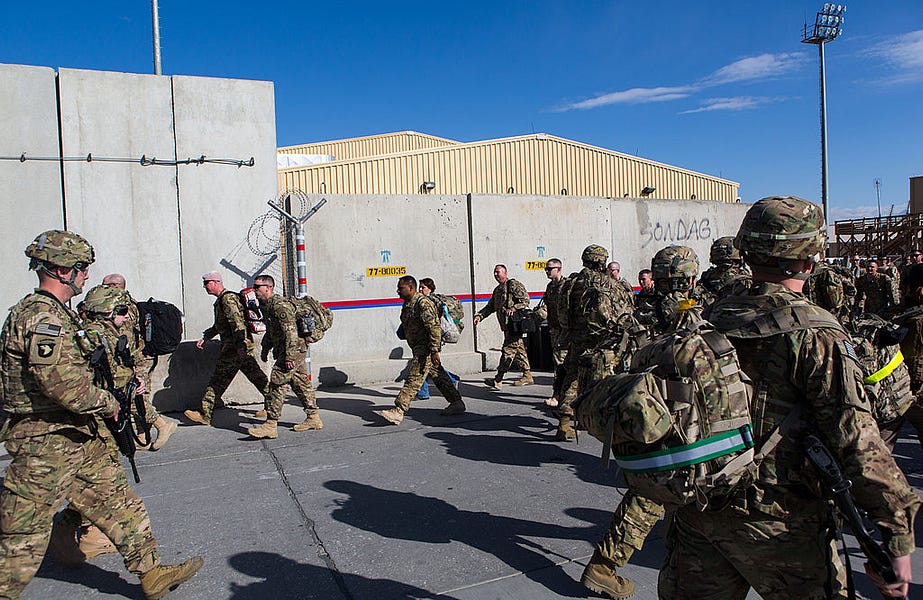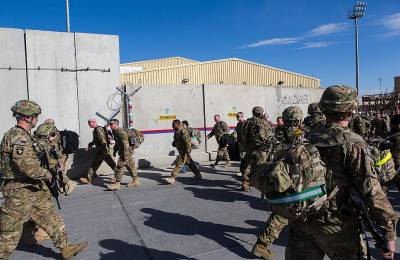With dizzying speed, the Taliban has seized a dozen provincial capitals across Afghanistan in the past week. On Thursday militants seized Herat, the country’s third-largest city, one with a reputation for being relatively urbane and strongly antipathetic to the Taliban’s jihadist vision. U.S. intelligence reportedly estimates that Kabul could fall within 90 days of the U.S. withdrawal.
As Afghanistan collapses, there is no shortage of explanations, justifications, and outright myths taking root, some encouraged by the Biden administration. Among the most common: This was inevitable. The U.S. presence was unsustainable, critics say. The administration was boxed in by the 2020 peace deal with the Taliban. If the U.S. had repudiated the deal, the Taliban would have gone on the offensive and resumed killing U.S. troops.
And for what? We gave it our best for 20 years, they say, proving that the mission was effectively impossible. The rapid collapse only demonstrates that we were never going to succeed no matter how long we stayed. We achieved the most important thing: Osama bin Laden is dead. The Afghans have to run their own country. We cannot stay there forever, we shouldn’t try nation building, and we can keep an eye on al-Qaeda from afar to make sure they do not threaten us.
On the surface, these explanations make a compelling case. It is also a comforting case, because it washes our hands of responsibility for what is about to happen. As a humanitarian catastrophe unfolds—as Afghan women fall back under the Taliban’s uniquely cruel tyranny, as the Hazara and Shiites flee the Taliban’s near-genocidal oppression of religious dissidents—we can tell ourselves, “There’s nothing we could have done.”
These myths function as an ex post facto explanation that we—the most powerful nation in the world—were actually powerless all along. It turns out we didn’t fail because of bad decisions, strategic incompetence, or moral myopia. We failed because no one could have succeeded, because the mission was inherently impossible. No amount of insight, troop surges, or Marshall-Plan-level reconstruction assistance could have made a difference.
Of course, none of that is true. The myths are just that: myths. The U.S. presence in Afghanistan the last few years was tiny—just 2,500 troops before the start of the final withdrawal. It was indefinitely sustainable. There is no significant antiwar movement to speak of, there is no domestic political pressure to withdraw, and no election will hinge on U.S. policy toward Afghanistan.
U.S. troops faced low risks in Afghanistan, and the low casualty rate is not a function of the 2020 peace deal. Just 66 U.S. personnel have been killed in action since 2014, less than one per month for nearly seven years. That is not to make light of the loss of individual soldiers, but it is to recognize, in historical perspective, that the conflict in Afghanistan is very small and U.S. ground troops have not been involved in direct combat in large numbers for years.
The U.S. mission in Afghanistan accomplished some important successes. There have been no large-scale international terrorist attacks emanating from Afghanistan or Pakistan since 2001. The Afghan people broadly support the country’s new constitution. The Afghan economy showed consistent growth. By virtually every metric of human development, Afghans are better off today than they were 20 years ago. The intervention was not an unmitigated failure—except that many of these successes are likely to unravel with the Afghan army’s collapse.
The rapid collapse of the Afghan army in recent weeks was not inevitable and is not a sign that the mission was always doomed, nor that we never would have succeeded. We had been making slow, fitful progress building a new Afghan security force from scratch. In 2021, it was better than it had been in 2001—because in 2001 it did not exist. It was better than it had been in 2006—because the Germans, British, and the U.N., which had assumed responsibility for training the new army and police, wasted five years doing essentially nothing.
The U.S. took over and cobbled together a fighting force by 2010, one that has lost tens of thousands of soldiers keeping the Taliban at bay for the past decade. The Afghan army was again better this year than previously, but the Department of Defense truthfully reported year after year that it was not ready for fully independent operations yet.
The Afghan army’s collapse this summer is demoralizing for anyone who has watched or participated in the war. Historians will give us the full story decades from now, but surely President Biden’s announcement of a full withdrawal—when everyone, including the U.S. Department of Defense, knew the Afghan army wasn’t yet ready to stand independent of international assistance—had a crippling effect on the morale of Afghan troops.
Some Americans are now sneering at the Afghan troops’ supposed lack of willpower, patriotism, or grit—but consider, if you know that your army is simply not equipped to win the battle that’s coming, why fight? It is an individually rational decision to save your life by not fighting, a decision that, when multiplied, loses a war.
It is easy to envision the counterfactual: If the United States had maintained a small presence (perhaps marginally larger than what Trump left behind), it could have kept the Afghan army in the field indefinitely, giving time and space for the political situation in Kabul to sort itself out, for a fresh round of negotiations with better leverage against the Taliban, and for reconstruction and development to continue.
Critics may complain that “we can’t stay forever.” Perhaps, but we could have stayed long enough for the military presence to evolve, very gradually, into a near-peacetime deployment. Again, the military presence was small, low-risk, and relatively low-cost.
And we should have stayed because the mission is not over. While bin Laden is dead, al-Qaeda is not and, along with the Islamic State and a murderer’s row of copycat jihadists, is almost certain to regain safe haven in Afghanistan and Pakistan following the collapse of our allies. Our presence for the past 20 years kept jihadists on the run, in hiding, and focused on avoiding our air strikes and special forces. They now will have room to breathe, which means room to plan, recruit, train, and fundraise.
The myths about Afghanistan’s collapse—that we were actually powerless and the mission was always inevitably doomed—denies the reality of the United States’ agency. Our policymakers made specific strategic missteps that caused direct, avoidable harm, including Bush’s light footprint, Obama’s withdrawal timetable, Trump’s peace deal, and Biden’s inexplicable withdrawal, each of which made a bad situation worse. Those decisions were made by politicians elected by and accountable to the U.S. electorate, who largely ignored the war and enabled policymakers’ strategic muddling for two decades.
That is why Biden’s claim that the Afghans just have to start taking responsibility for their own country is so mendacious. He is telling a drowning man to take responsibility for swimming while reeling in the life preserver the man had been clinging to. He is overestimating the Afghans’ ability to fight on their own while minimizing American responsibility for the crisis in the midst of which we are abandoning them—all while preaching a soothing myth that there was nothing we could have done after all. Many Americans will be eager to believe him because it is much easier, emotionally and cognitively, to believe in the myth of our powerlessness than in the reality of our own stupidity and moral cowardice.
Paul D. Miller is a professor of the practice of international affairs at Georgetown University. He served as director for Afghanistan and Pakistan on the national security council staff for Presidents George W. Bush and Barack Obama. He is a veteran of the war in Afghanistan. His most recent book is Just War and Ordered Liberty.






Please note that we at The Dispatch hold ourselves, our work, and our commenters to a higher standard than other places on the internet. We welcome comments that foster genuine debate or discussion—including comments critical of us or our work—but responses that include ad hominem attacks on fellow Dispatch members or are intended to stoke fear and anger may be moderated.
With your membership, you only have the ability to comment on The Morning Dispatch articles. Consider upgrading to join the conversation everywhere.